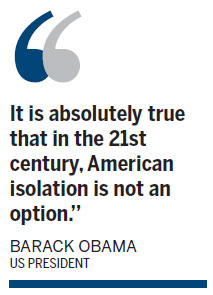Obama seeks middle ground between intervention, isolation
Military Academy commencement speech avoids mention of 'pivot'
US President Barack Obama said on Wednesday that the United States remains the only nation with the capacity to lead on the world stage, but he argued it would be a mistake to channel that power into unrestrained military adventures.
Obama's approach, outlined in a commencement address at the US Military Academy, underscored his efforts to straddle the line between global isolation and intervention. Neither view, he said, "fully speaks to the demands of this moment".
"It is absolutely true that in the 21st century, American isolation is not an option," Obama said in remarks to more than 1,000 of the military's newest officers. "But to say that we have an interest in pursuing peace and freedom beyond our borders is not to say that every problem has a military solution."
Obama has often struggled to articulate not only what should fill the space between intervention and isolation but also any success the administration has had in finding that middle ground.
His preferred tool kit, which includes economic sanctions, diplomatic negotiations and international coalition building, rarely generates quick fixes and is often more ambiguous than military action.
The president's strategy has also garnered mixed results. While diplomacy and sanctions have brought the US and Iran closer to a nuclear accord than ever before, neither approach has stopped the bloodshed of Syria's civil war or prevented Russia from annexing territory from Ukraine.
The result at home has been a drumbeat of criticism from Republicans and others who say the president has squandered America's global leadership and emboldened international foes in Syria and Russia, as well as China. The public's approval of the president's foreign policy has declined, even as his policies hew closely with Americans' stated opposition to more military conflicts.
Obama's speech on Wednesday was part of concerted White House efforts to answer critics and more clearly define his foreign policy philosophy.

The president declared that seeking international consensus through the United Nations or NATO is an example of American leadership, not weakness. He vigorously defended his belief that unilateral American military action should be reserved for instances where core national interests are challenged or the public's safety is in jeopardy.
Thirteen years after 9/11, Obama said terrorism remains the most direct threat to American security, though the risks of a massive attack on the homeland from a centralized al-Qaida have taken a back seat to more-diffuse threats from an array of affiliate groups.
As the threat changes, so too must America's response, Obama said. Instead of large-scale military efforts, he called for partnering with countries where terrorist networks seek a foothold, including Yemen, Libya and Mali. If there was anything missing from his speech, it was a specific mention of what has been a signature tune of his administration's diplomacy: the "pivot" to Asia.
It's a far cry from the tone Obama struck in another keynote foreign policy speech he made in Australia in November 2011, where he declared that in the Asia-Pacific in the 21st century, "the United States of America is all in."
However, there were several references to Asia in the speech, and US allies in the region may draw some comfort from Obama's pointed references to China's economic rise and military reach and its conduct in maritime territorial disputes.
(China Daily 05/30/2014 page12)














